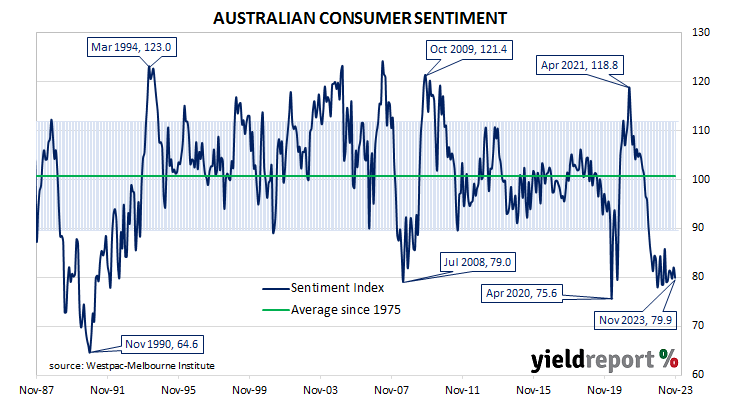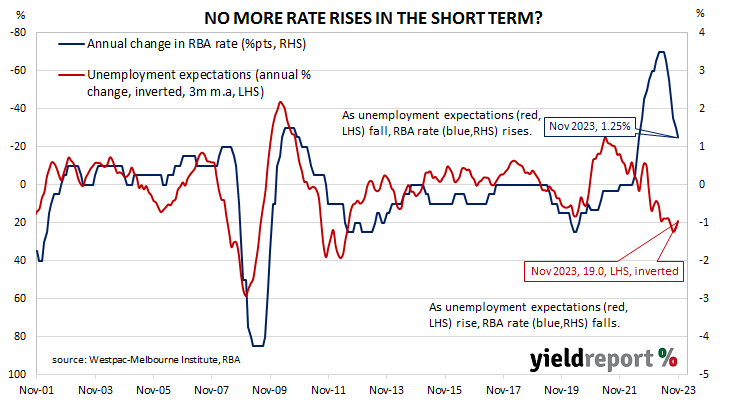Summary: Westpac-Melbourne Institute consumer sentiment index down in November; rate rise puts “renewed pressure on family finances”; ACGB yields barely move; rate-rise expectations unchanged; tentative signs sentiment starting to lift “cut short”; three of five sub-indices lower; more respondents expecting higher jobless rate.
After a lengthy divergence between measures of consumer sentiment and business confidence in Australia which began in 2014, confidence readings of the two sectors converged again in mid-July 2018. Both measures then deteriorated gradually in trend terms, with consumer confidence leading the way. Household sentiment fell off a cliff in April 2020 but, after a few months of to-ing and fro-ing, it then staged a full recovery. However, consumer sentiment has deteriorated significantly over the past two years, while business sentiment has been more robust.
According to the latest Westpac-Melbourne Institute survey conducted in the second week of November, household sentiment has deteriorated and is at a quite pessimistic level. Their Consumer Sentiment Index fell from October’s reading of 82.0 to 79.9, a reading which is still well below the “normal” range and significantly lower than the long-term average reading of just over 101.
“The RBA’s November rate hike has put renewed pressure on family finances and reignited concerns about both the rising cost of living and the prospect of further rate rises to come,” said Westpac senior economist Matthew Hassan.
Any reading of the Consumer Sentiment Index below 100 indicates the number of consumers who are pessimistic is greater than the number of consumers who are optimistic.
The report was released on the same day as the latest NAB Business Survey and Commonwealth Government bond yields barely moved on the day. By the close of business, 3-year and 10-year ACGB yields had both returned to their respective starting points at 4.30% and 4.68% while the 20-year yield finished 1bp lower at 4.97%.
In the cash futures market, expectations regarding further rate rises remained essentially unchanged. At the end of the day, contracts implied the cash rate would increase from the current rate of 4.32% and average 4.335% through December and 4.405% in February. May 2024 contracts implied a 4.49% average cash rate while August 2024 contracts implied 4.48%, 16bps more than the current rate.
“Previous months had been showing some tentative signs that sentiment might was starting to lift out of the deep pessimism that has prevailed since the middle of last year,” added Hassan. “That rally looks to have been cut short before it even really began.”
Three of the five sub-indices registered lower readings, with the “Family finances – next 12mths” sub-index posting the largest monthly percentage loss.
The Unemployment Expectations index, formerly a useful guide to RBA rate changes, rose from 127.3 to 130.4. Higher readings result from more respondents expecting a higher unemployment rate in the year ahead.



